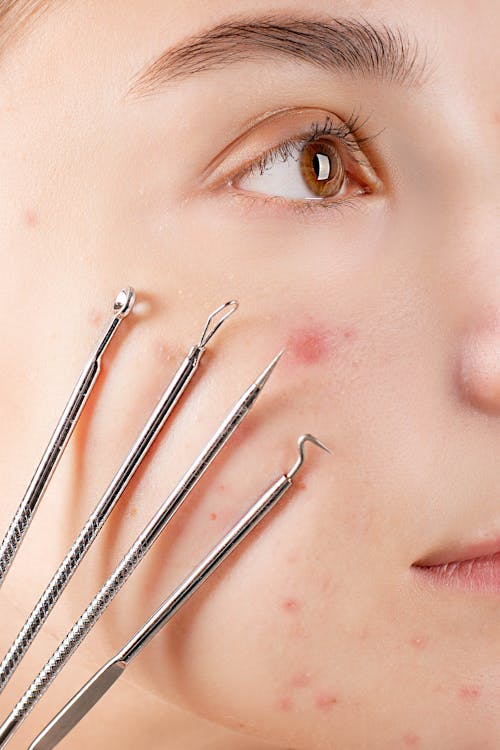
Teen Health
ACNE
Acne is a skin condition strongly associated with the teenage years, affecting nearly 80% of teens. It’s unfortunate how acne appears just when teenagers are becoming so preoccupied with their outward appearance and what others think about them. Acne generally affects girls at a younger age than boys, though boys tend to develop more severe acne.
Acne is caused by sebum coming out of the sebaceous glands of the skin and getting blocked. Blackheads form when this sebum becomes oxidized. Whiteheads form when sebum accumulates along with white blood cells in an inflammatory reaction. Acne is not limited to the face, but can also appear on the neck, chest, back, and shoulders.
Bodybuilders can develop severe acne as a side effect of steroid use.
No direct links have been proven between the role of diet and acne. Nor is acne caused by dirt on the skin.
To prevent acne, washing the face 2 or 3 times with a mild cleanser is recommended. Do not use drying soaps, or rubbing alcohol on the face.
Benzoyl peroxide is the first line of defence when acne makes an appearance. Available over the counter in 2.5, 5 and 10% strengths, start with the lowest strength, and move your way up if need be. Apply 1-2 times per day after cleansing the face. Do not aggressively scrub the face with gritty facial scrubs or rough sponges, loofahs, etc. Avoid the use of oily cosmetics, and look for hypoallergenic, non-comedogenic (non-pore-blocking) formulations.
The vitamin A derivative, retinol, is effective in unplugging pores and getting rid of blackheads. Ask your doctor for more information about this product. It is often used at night, with benzoyl peroxide being applied in the morning.
Azelaic acid is a newer topical ointment which is applied twice daily for one month.
There are 2 types of oral medications that may be considered for severe acne. First, oral antibiotics can be helpful with extensive inflammation present. The second is isotretinoin (known as Accutane) which is a very strong vitamin A derivative. With these medications, there are side effects, especially to a fetus, should the mother become pregnant. Generally, Accutane is not given without a prescription for birth control because of the severe deformities it could cause in an unborn baby. These medications warrant a lengthy discussion between teens, parents and doctors of the risks and benefits, and how this works with your family values.
Teen depression involves persistent sadness, painful thoughts and physical symptoms.
TEEN DEPRESSION
Depression is persistent, sad or negative mood disturbance that also affects other body systems.
Symptoms of teen depression include:
- Continued sadness or moping
- Loss of interest in things they once enjoyed, constant complaints of boredom and tiredness
- Withdrawing from friends and family
- Poor attitude and performance at school
- Hostile outbursts
- Acting out in dangerous ways such as drug/alcohol use, sexual activity, physical fighting, running away
- Painful thoughts
- Thinking about, critiquing and analyzing themselves constantly
- Overwhelming anxiety
- Feelings of hopelessness
- Physical symptoms
- Changes in eating habits which may include loss of appetite and weight loss, or excessive hunger and weight gain
- Sleep troubles such as insomnia or hypersomnia (excessively sleeping)
- Headaches, stomach aches, nausea, panic attacks
- Sometimes hallucinations
If you suspect that your teenage son/daughter is depressed:
- Listen, really listen to your teenager. Try not to do too much talking, but really listen to his/her problems, concerns and fears.
- Visit your family doctor, and get any referrals necessary.
- Go to counselling. Find a trained counsellor that is experienced with teenagers. Attend sessions with your teenager, if the counsellor suggests, or let them go on their own, or both.
- Consider medication for your teenager the doctor or psychiatrist recommends it.
- Watch for signs of suicidal behaviour.
Warning signs and symptoms of a teenager considering suicide:
- Suicide by another family member
- Threatening or talking about suicide
- Giving away possessions
- Firearms in the home
- Drug or alcohol abuse
- A negative life-changing event such as a divorce or death in the family
If you suspect that your teenager is considering suicide:
- Seek medical/psychiatric help immediately
- Remove guns and drugs from the house (even over the counter drugs)
- Stay with your teenager, do not leave him/her alone





